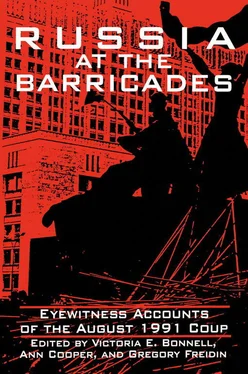In the months preceding the coup there were many signs that conservative forces—a coalition of leading officials in the RSFSR Communist Party and key members of the KGB, the Ministry of Internal Affairs (MVD), and the armed forces, along with some well-known ultra-nationalist Russian writers—were coalescing in opposition to reformist policies. [4]
In mid-June, critics of perestroika in the government leadership—including future putschists Valentin Pavlov, Dmitrii Yazov, Boris Pugo, and Vladimir Kriuchkov—attempted to carry out a “constitutional coup d’état” by expanding the powers of Prime Minister Pavlov, an outspoken opponent of the new Union Treaty which was then being negotiated. Their efforts failed.
On July 23, 1991, twelve Soviet leaders, including high-ranking army officers, published a dramatic appeal in the conservative newspaper Sovetskaia Rossiia which called on “citizens of the Soviet Union” to resist the breakup of the country, allegedly being engineered by greedy capitalists, foreign-directed elements, and cunning apostates. Hitherto such charges predictably had issued from the lunatic fringe of the conservative opposition. Not so this time: the signatories included such powerful figures as Colonel General Boris Gromov, the Deputy Minister of Internal Affairs and a hero of the Afghan War. This appeal, published under the title “A Word to the People,” prefigured many of the arguments put forward by the putschists less than a month later. With its special reference to the role of the armed forces in preserving “Holy Russia,” this statement brought into the open the possibility of a military seizure of power.
Both former Foreign Minister Shevardnadze and Aleksandr Yakovlev felt sufficiently alarmed by the course of events to issue repeated warnings of an impending coup. [5]In June 1991, Secretary of State James Baker conveyed to Gorbachev, through secure channels, a report that Pavlov, Yazov, and Kriuchkov were plotting his overthrow. But Gorbachev refused to follow up these and other alarm bells with decisive action. [6]In an interview conducted in August 1991, only a few days after the attempted coup, Shevardnadze was asked why Gorbachev had failed to take action to prevent a seizure of power by high-ranking officials, most of whom he had appointed. Shevardnadze replied:
Most likely, he did not understand; probably he did not want to understand. Therein lies the whole tragedy, the whole trouble. This feature is characteristic of many leaders. There are numerous examples throughout history where a person does not want to believe that terrible things are going on. In my opinion, this is what happened with Mikhail Sergeevich. And this grieves me tremendously. It has cost the country dearly. [7]
The immediate circumstance that precipitated the coup was the signing ceremony for the new Union Treaty, scheduled for August 20. The treaty would have granted supremacy to the laws of the republics in many areas and permanently curtailed the power of the central government—and with it, Communist Party rule. Conservatives, among others, were especially indignant when Gorbachev did not make public the text of the new Union Treaty. Even cabinet ministers had no access to the text until a draft version fell into the hands of the editors of Moscow News , who published it a few days before the coup. [8]There was also suspicion that Gorbachev may have struck a secret deal with the G7 leaders with whom he had met in London in July, leaving Prime Minister Valentin Pavlov out of the negotiations. [9]
Although the impending Union Treaty was the galvanizing event, there were other factors that aroused the plotters to action. [10]Gorbachev’s skill at maneuvering between the opposite ends of the political spectrum had been making conservatives seasick for a number of years. From their point of view, the worst turn had come in April 1991. From September 1990 to April 1991 it had seemed that Gorbachev had thrown in his lot with the old guard. How outraged they must have been when Gorbachev suddenly struck an alliance with Boris Yeltsin (who had publicly resigned from the Communist Party the previous July) and embraced a number of important economic and political reforms in the months preceding the coup. One item high on the conservatives’ bill of particulars was Yeltsin’s ban on the workplace activities of political parties in the Russian Federation, issued on July 20, not long after his election as President of Russia. Clearly directed against the Communist Party, since it spelled an end to the Party’s grassroot system of control, the ban caused great consternation among conservatives. Worse yet, their failure to force Yeltsin to rescind this decree demonstrated unmistakably that the Party, the erstwhile colossus, had lost its iron grip.
All of these developments, moreover, took place against the background of a deteriorating economic situation. By mid-summer, there were strong indications of impending shortages of fuel and food, as the command system collapsed and republics and even localities set up protectionist barriers to guard local supplies.
Feeling increasingly irrelevant, afraid that Gorbachev’s next maneuver would throw them overboard, the plotters resolved to take action. The decisive meeting of the conspirators took place on August 16 at a KGB resort on the outskirts of Moscow. [11]
* * *
When the coup began on Sunday, August 18, 1991, Gorbachev was vacationing with his family in Foros, on the Crimean peninsula. The plotters’ first act was to send a delegation to Foros—led by Valerii Boldin, the President’s Chief of Staff, along with Yurii Plekhanov, Chief of the Security Directorate of the KGB—to seek Gorbachev’s own sanction for the takeover. Some of the plotters, it appears, believed that, although he might offer resistance at first, Gorbachev would in the end cooperate with them by declaring a state of emergency in the country. After all, he had yielded to pressure from conservatives in the past. Gorbachev, however, refused to play any part in the scheme, calling the instigators “adventurists” and using (in the words of one of the plotters) other “non-parliamentary expressions.” Held under house arrest and with no means of communication with the outside world, Gorbachev and his family would remain in complete isolation, unsure of their fate, until the afternoon of Wednesday, August 21.
Gorbachev’s refusal to play along with their plans disoriented the conspirators, but they decided to proceed with the takeover, in the hope that the country would welcome their move as heralding a respite from disruptive change and mounting disorder.
* * *
In the early morning of Monday, August 19, troops were mobilized in the vicinity of Moscow and large numbers of tanks and armored personnel carriers (APCs) began moving toward the city. Beginning at 6:00 A.M. Moscow time, the country awoke to television and radio broadcasts announcing the formation of the State Committee for the State of Emergency. [12]The junta consisted of eight men, seven of them high-ranking members of the government and all of them identified with the top echelon of the party-state: Vice President Gennadii Yanaev; KGB chief Vladimir Kriuchkov; Defense Minister Dmitrii Yazov; Minister of Internal Affairs Boris Pugo; Prime Minister Valentin Pavlov; Oleg Baklanov, First Deputy Chairman of the National Defense Council and leader of the military-industrial complex; Vasilii Starodubtsev, Chairman of the Peasants’ Union; and Aleksandr Tiziakov, President of the Association of State Enterprises and Industrial Groups in Production, Construction, Transportation, and Communications and member of the Council of Ministers.
The Committee’s first public statements announced the imposition of a state of emergency in the country to rescue “our great Motherland” from the “mortal danger” that loomed over it. The form as much as the content of these statements indicated clearly that the Emergency Committee wished to turn back the clock to an earlier era, to restore the law and order once commanded by an all-powerful Communist Party, and to preserve the Soviet Union as a unitary state.
Читать дальше












